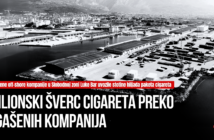State-owned companies Plantaze 13. jul and Montenegro Airlines, as well as the Investment and Development Fund (IDF), led the way in hiding data on money consumption in the pre-election period, although previous institutional and judicial practice oblige to make such information available to the public.
According to a recently published report on the expenditure of state funds on the eve of the parliamentary elections held on 16 October 2016, which was created by MANS, the two state-owned companies and the IDF rejected MANS’s requests submitted in accordance with the Law on Free Access to Information related to their expenditures in the pre-election period.
They claimed that they were not obliged to implement it, despite the fact that the Agency for Protection of Personal Data and the Free Access to Information clearly stated the law had to be enforced.
The IDF, which is fully owned by the state and has an annual portfolio of approximately €100 million credit support for small and medium businesses, has consistently refused to submit the decisions on granting loans, on the grounds that they are already available on the institution’s website.
However, the website only provides a table with an overview of the allocated loans, but not the contents of the decisions to grant the loans, from which one could see a number of important data such as the date when they were adopted, under what conditions were provided, or what were the collaterals. It is interesting that the IDF submitted such data to MANS two years earlier, until September 2014.
Data that MANS Investigation Center has from previous election cycles revealed that the IDF allotted the highest number of loans to individual farmers right before the pre-election period. The head of the Fund is a prominent official of the ruling party Zoran Vukcevic, who is one of the actors of the infamous affair “Tape Recording”.
With regard to the publication of data on expenditures, particularly interesting is the example Plantaze, which said they “have trade secret rule book, which restricts the publication of the requested information.” However, an internal act of the company cannot have a greater legal power than a legal act, in this specific case the Law on Free Access to Information.
A drastic example is Montenegro Airlines, which has refused to submit the requested information on the grounds of being financed from its own resources and not from the budget. The airlines officials have neglected the fact that the state is the owner, and that the company received subsidies of around €60 million at the expense of the state budget.
The two state-owned companies are under the special attention of the public in pre-election periods, especially because of the suspicion that thezy mostly employ in such periods.
MANS submitted over 16,000 requests for free access to information related to expenditure of budgetary funds in the election year and got feedback to every third request. The data show that Montenegrin institutions allow access to information in nearly 30 percent of cases, while in four percent of cases they partly allowed access to information. In around 40 percent of cases, access to information is denied, because the institutions, as explained, were not in possession of the requested information.
Covert employments in Niksic
Mid-June this year, the municipality of Niksic banned the access to information about employment, arguing that it was in order to protect privacy of employees.
However, the current practice of the second instance authority, which is the Agency for Protection of Personal Data and the Free Access to Information, confirms that the data on employment in the civil service are public.
Due to the Agency’s violation of the legal deadline for reaching a decision, five months later, MANS is still not in possession of the requested information.
Authors:
Marko Vesovic
This text is created with the support of the European Union and the U.S. Embassy Podgorica. Network for Affirmation of Non-Governmental Sector – MANS is solely responsible for the contents of this article, and the views taken herein shall not in any case be considered as those of the European Union.



